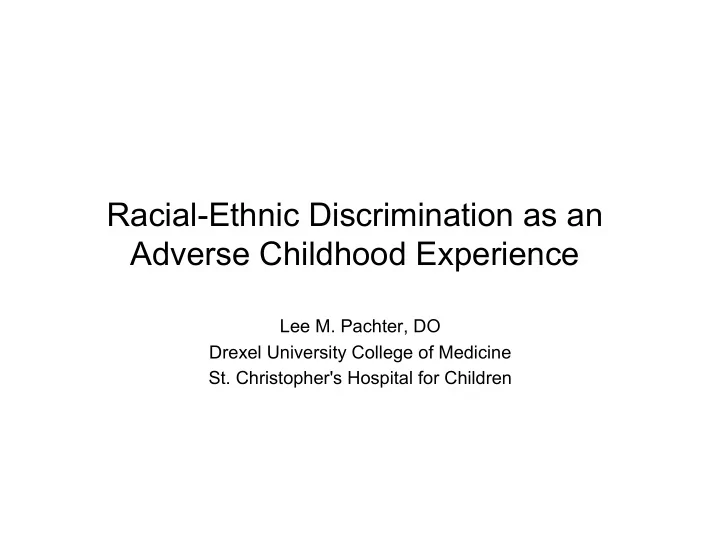

Racial-Ethnic Discrimination as an Adverse Childhood Experience Lee M. Pachter, DO Drexel University College of Medicine St. Christopher's Hospital for Children
• Are there adverse childhood experiences/ toxic stressors that are unique to context (e.g. poverty, social class, minority status, race/ethnicity)?
• In these contexts, does the exposure to multiple ACEs/TS qualitatively change the relative consequences of any one adverse experience?
Racism and Child Health Literature Review • 40 papers found in medical and social science literature – 8 Birth outcomes (prematurity, LBW) – 4 Cardiovascular health – 2 Metabolic disease – 26: Behavioral /Mental health Pachter LM, Garcia Coll CG. J Develop Behav Pediatr. 30:255-263. 2009
Items • Watched closely or followed around by • Someone called you an insulting name security guards or store clerks at a store • People hold their bags tight when you pass or the mall them • Got poor or slow service at a restaurant or • Someone made a bad or insulting remark food store about your race, ethnicity, or language • Were treated unfairly by a police officer • Someone didn ’ t want to play or hang out • Were treated badly by a bus driver with you • Got poor or slow service at a store • Someone was rude to you • Accused of something you didn ’ t do at • People assume you ’ re not smart or school intelligent • Unfairly called down to the principal ’ s • You didn ’ t get the respect you deserved office • You weren ’ t chosen for a sports team • Got grades you didn ’ t deserve • Teachers assume you ’ re not smart or • Treated badly or unfairly by a teacher intelligent • Watched more closely by security at • You ’ re called on less in class by teachers school • Have you ever seen your parents or other • Someone didn ’ t want to be friends with family members treated unfairly or badly you because of the color of their skin, language, accent, or because they come from a • You had the feeling that someone was different country or culture? afraid of you
• When people are racially discriminated against, they’re treated badly, not given respect, or are considered inferior because of the color of their skin, because they speak a different language or have an accent, or because they come from a different country or culture. For each of the following situations, think whether you have ever in your life felt discriminated against because of your color, language or accent, or because of your culture or country of origin, and answer the following questions:
1. Watched closely or followed around by security guards or store clerks at a store or the mall 1a. Has this happened to you? ____Yes ____No If Yes, how often: ____once ____twice ___about once a year ___about once a month ___weekly 1b. Why do you think it happened to you? (you can choose more than one answer) ___the color of my skin ___my race ___my ethnicity or culture ___my language ___my accent ___my age ___my sex/gender ___the clothes I wear ___the music I listen to ___other (describe_______________________________) 1c. How did this make you feel? (you can choose more than one answer) ___angry ___mad ___hurt ___frustrated ___sad ___depressed ___hopeless ___powerless ___ashamed ___strengthened ___other (describe_________________________________) 1d. How did you deal with it? (you can choose more than one answer) ___ignored it ___accepted it ___spoke up ___kept it to myself ___lost interest in things ___prayed ___tried to change things ___hit someone/something ___tried to forget it ___worked harder to prove them wrong ___other (describe___________________________________)
• 277 children (Hartford CT, Providence RI) – 38% Latino/a (Puerto Rican) – 31% African American – 7% Afro Caribbean – 19% Multicultural/multiracial
Perceived Racial Discrimination in at least 1 item… • 18% • 34% • 66% • 88%
Perceptions of Racial Discrimination • 88% (245/277) perceived racial discrimination in at least 1 of the 23 items • Mean number of positive responses = 6 • 12% answered more than half of the questions positively
Racism, Depression, Self Esteem .379** DEPRESSIVE RACISM SX. .121 .483** SELF ESTEEM ** p<0.01
Figure ¡1: ¡Conceptual ¡Model ¡for ¡How ¡Perceived ¡Racism ¡Increases ¡Disease ¡Risk ¡ ¡ Processing ¡of ¡the ¡ Chronic ¡Adapta:on ¡ ¡ Physiologic ¡ ¡ Social ¡Environment ¡ to ¡Social ¡Stressors ¡ Dysregula:on ¡ (allosta:c ¡load) ¡ Perceived ¡ Social ¡ HPA HPA Status ¡ Dysregulation Dysregulation (cortisol) (cortisol) Physiological ¡ morbidity ¡ Stress (CVD, ¡ PERCEIVED ¡ Diabetes, ¡ SMA SMA RACISM ¡ Obesity, ¡ Dysregulation Dysregulation MDD, ¡ (CV reactivity; (CV reactivity; arterial arterial Asthma) ¡ elasticity) elasticity) Psychological Coping ¡ Stress Altered Altered Responses ¡ Inflammation Inflammation (IL-6; CRP) (IL-6; CRP) Racial ¡ Iden:ty ¡
Thanks • Colleagues: • Funders – Bruce Bernstein – NICHD – Cynthia Garcia Coll – Philadelphia Health & Education Corp. – Laura Szalacha – John Rich • Children & Families • Students: who participated in – Martine Saint Cyr these studies… – Dominique Cross
Recommend
More recommend